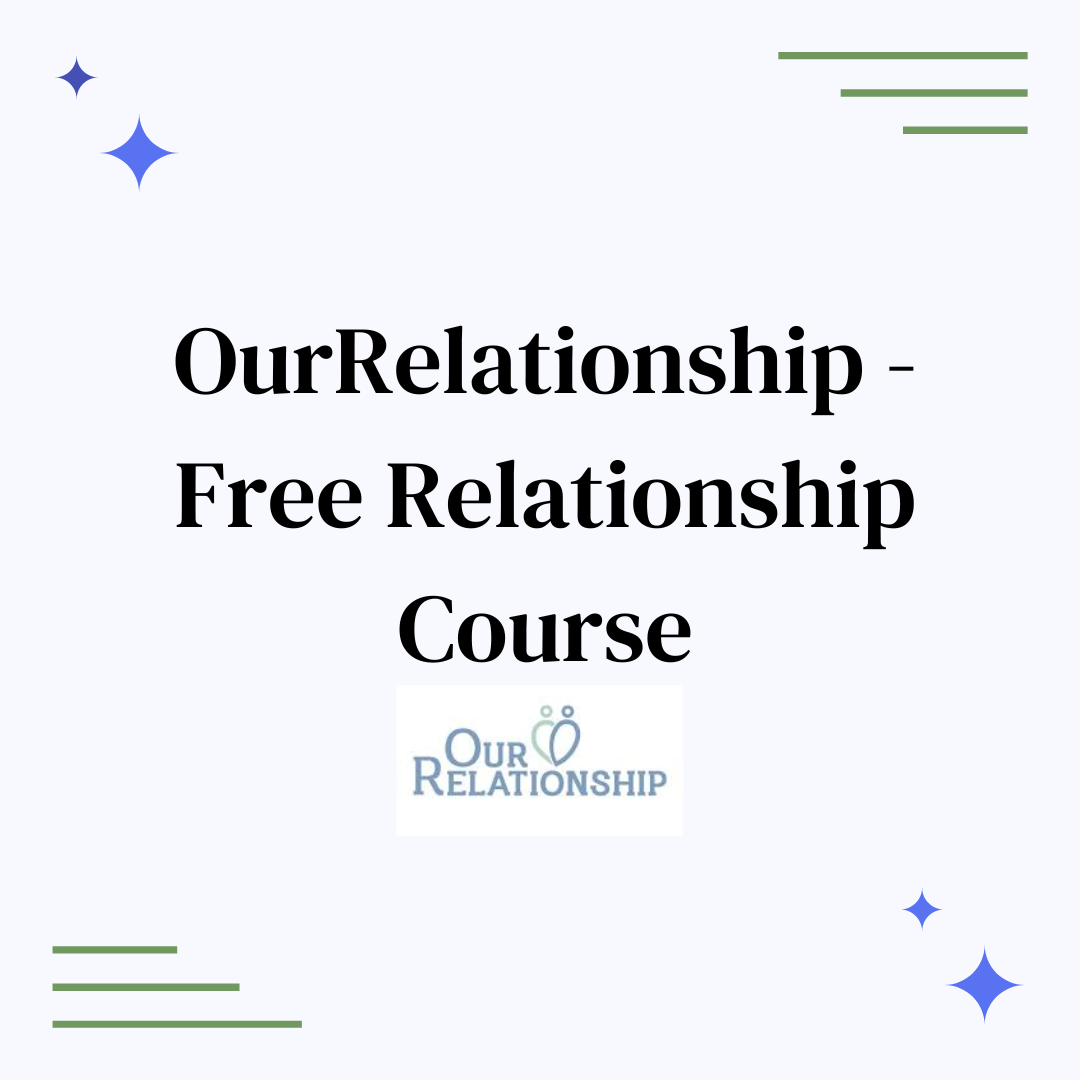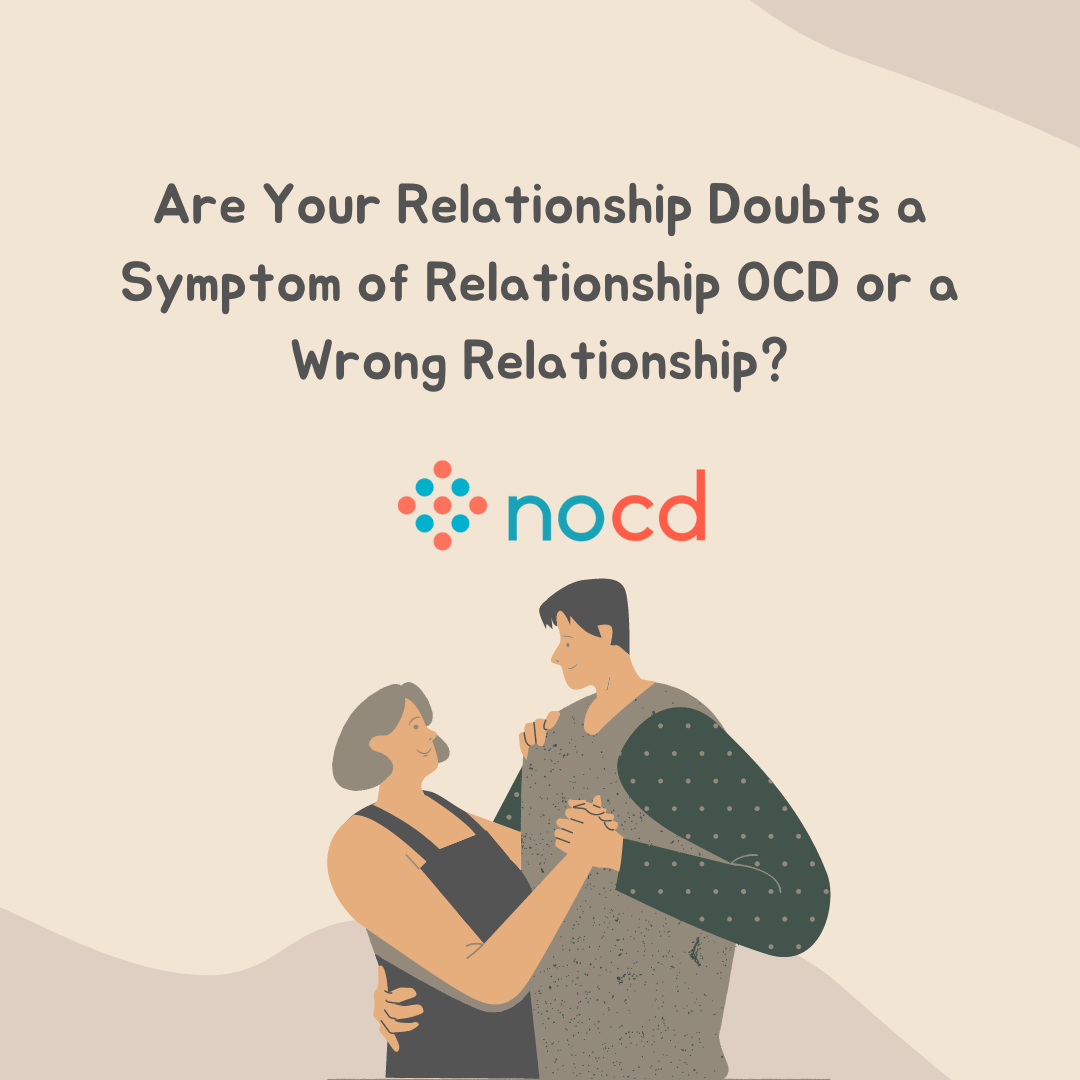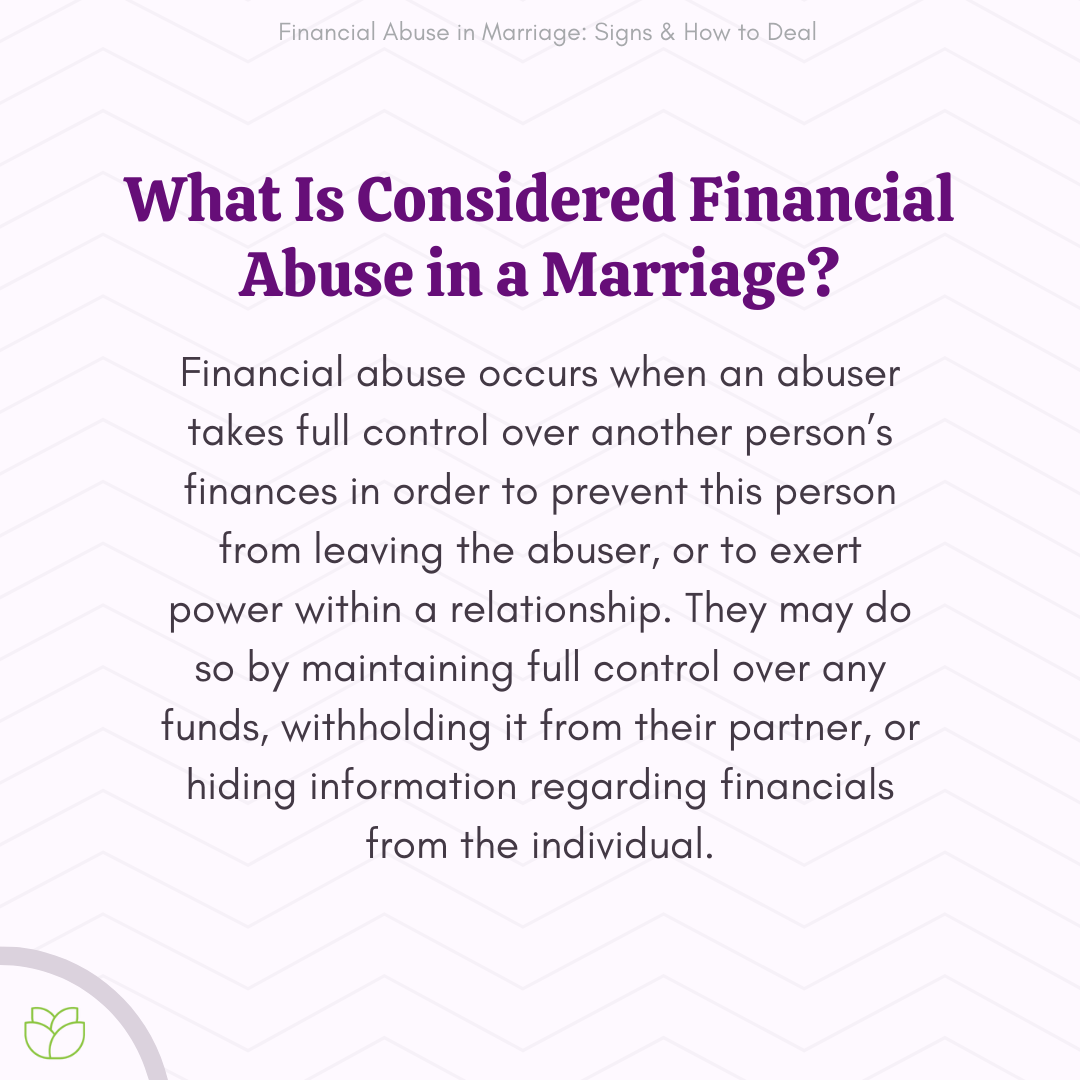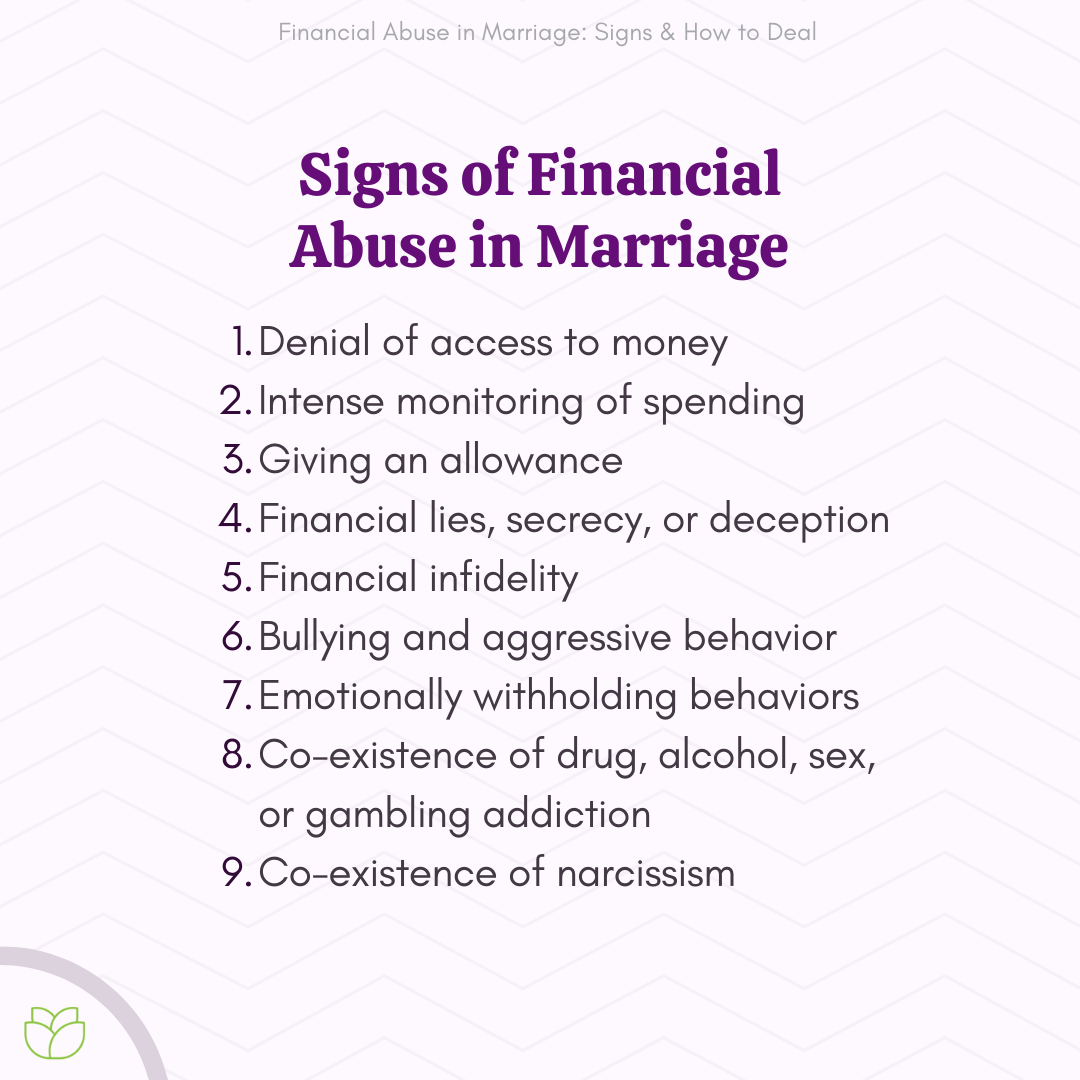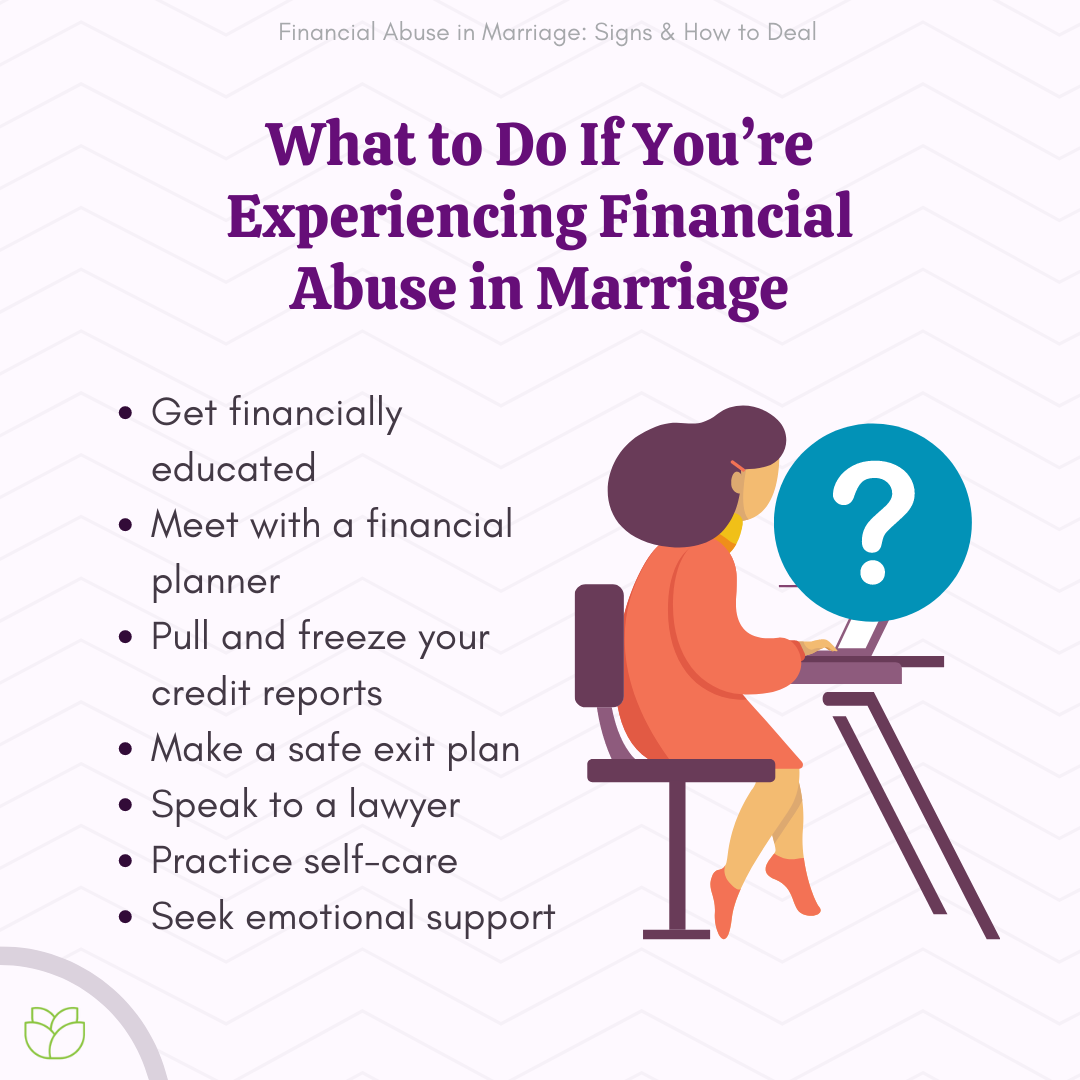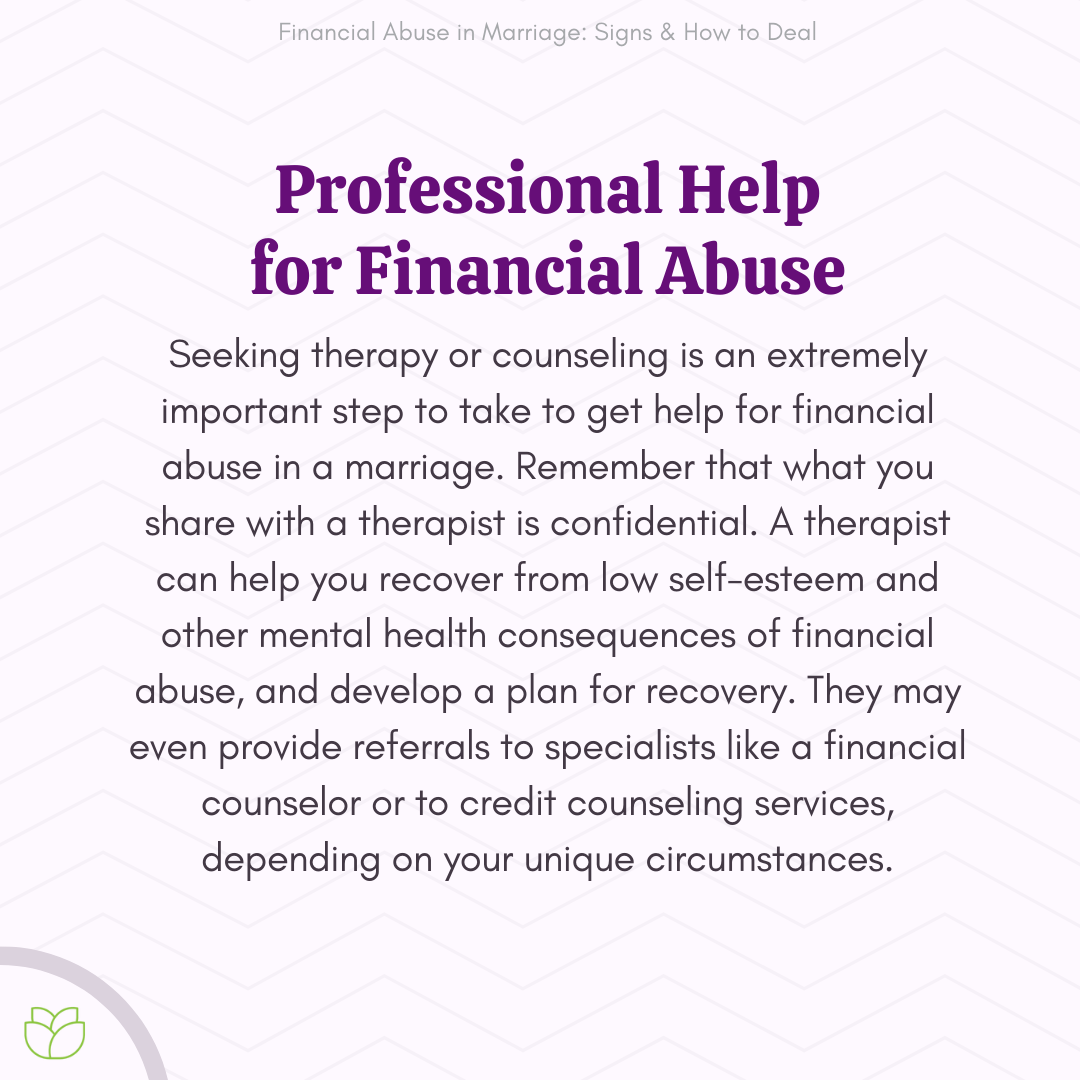Financial abuse in marriage is when one partner exerts financial control over the other. It may involve fostering financial dependence by limiting the ability to work or have access to money. It could also involve exploitation, like stealing the other person’s credit cards or identity for purchases or loans. Financial abuse in marriage is a form of domestic violence that can have harmful and lasting consequences.
Recover from an abusive relationship with the help of a therapist Therapy can help you overcome trauma and abuse. BetterHelp provides convenient and affordable online therapy, starting at $65 per week. Take a Free Online Assessment and get matched with the right therapist for you!
What Is Considered Financial Abuse in a Marriage?
Financial abuse occurs when an abuser takes full control over another person’s finances in order to prevent this person from leaving the abuser, or to exert power within a relationship. They may do so by maintaining full control over any funds, withholding it from the individual, or hiding information regarding financials from the individual.1
Financial abuse typically doesn’t start at the very beginning of a new relationship. It often begins when two people form a more shared financial life, such as when a couple moves in together or gets married. Like most forms of abuse, it doesn’t go from zero to ten right away, or it would be more easy to recognize or readily address. Financial bullying tends to be covert, starting with a few smaller behaviors, like commenting on the high grocery bill or asking how much your shoes cost. As the relationship progresses, it escalates into more serious behaviors like limiting your spending to giving you an allowance as if you were a child.
Financial abuse in relationships doesn’t only happen in marriage. Relationships and money go hand in hand. It can occur between non-married couples who are dating or ex-spouses. Moreover, it is common during the process of separation when determining alimony and child support. After a couple divorces, financial abuse can occur when an ex refuses to pay the alimony or child support.
9 Signs of Financial Abuse in Marriage
The signs of financial abuse in marriage range from emotional (fear, sadness, hopelessness, or anger), to physical (muscle tension, headaches, changes in sleep or appetite), cognitive (obsessive thoughts, difficulty concentrating, or worries), and relational (arguments or conflict avoidant behaviors like secrecy and lies). There is overlap between the signs of financial abuse in marriage, with general signs of an abusive relationship as well as signs of a controlling husband, wife, or partner.
Unfortunately, people can’t always discern whether or not their partner is trying to financially abuse them. This is because many financial abusers suffer from narcissism and are highly skilled at manipulation, and use gaslighting and other forms of emotional abuse to make their partner feel like they are the one with the problem or issue.
The following are nine signs of financial abuse in marriage:
1. Denial of Access to Money
Withholding resources such as access to bank accounts, credit cards, financial statements, transportation, property, healthcare, or even food is an offensive and neglective way to isolate a victim in an abusive relationship.
This can happen between parents and children, and other relationships that involve financial dependence like a sick, elderly, or disabled person who is in the care of someone else. Financial abuse can also happen in workplace settings, business partnerships, and basically any relationship where people fully or partially share financial assets.
2. Intense Monitoring of Spending
When your partner is accessing your online banking records, or reviews receipts from store purchases or online transactions with judgment and scrutiny, consider that intense monitoring of spending. These actions can feel like an invasion of privacy and cause a lack of trust and mutual respect in the relationship. When you feel like you are being micromanaged and controlled, it may trigger some defensiveness, or feelings of needing to justify, rationalize, or explain spending behaviors. All of this may lead to feelings of resentment or hardened anger.
This heightened level of financial accountability might be something you and your spouse agree upon during times of financial stress when you are working together on managing each other’s spending. It might also be necessary if you are recovering from a shopping addiction. However, ultimately each of us should be responsible for our financial lives and decisions. We need to operate in our financial relationships with honesty, integrity, transparency, and accountability.
3. Giving an Allowance
An allowance is typically a portion of money that a parent gives their children. Employers might also give it to employees to cover certain specific expenses. Allowances are generally a relatively small amount of money distributed by the person responsible for the finances to the person who is financially dependent. Consequently, there are elements of power, control, and restricted access to resources.
In a marriage, this can look like financial imbalance or financial inequity. Double standards may exist. One partner might be allowed to spend lots of money on clothes, accessories, or leisure activities, while the other is restricted in these areas. This imbalance may extend beyond the finances into other areas of the relationship. It may spill over into division of labor, and inequity in household or childcare responsibilities.
4. Financial Lies, Secrecy, or Deception
A lack of financial transparency can erode trust in a marriage, especially when somebody exhibits shady financial behaviors. Maybe it’s unexplained wads of cash in their wallet. Or, perhaps they are suddenly changing passwords on shared accounts and claiming they don’t remember the new login information.
5. Financial Infidelity
This is when the lies and secrecy reach a level of betrayal—such as having secret debt or assets. Several times in my practice, a client has discovered that their spouse has a secret second partner and family. That is a prime example of “financial infidelity.”
6. Bullying and Aggressive Behavior
This might include yelling, swearing, throwing objects, invading someone’s personal space, or other generally threatening behaviors. These behaviors are used to coerce and scare the victim of financial abuse into submission.
7. Emotionally Withholding Behaviors
To control financial decisions, choices, and behaviors, people can refuse hugs and kisses, sex, or other signs of personal affection and emotional connection. Unfortunately, financial abuse in marriage is very common, especially when it comes to domestic violence. In fact, financial abuse occurs in 99% of domestic violence cases in the United States.2 Moreover, it shares many of the same components of other invisible types of abuse in relationships including emotional abuse, sexual coercion, and parental alienation. In this case, the focus is on money and fostering financial dependence and financial control.
8. Co-Existence of Drug, Alcohol, Sex, and Gambling Addiction
Addiction can cause financial devastation to addicts and their families. One study interviewed family and friends of people with substance use disorder. About 82 percent noted the adverse financial consequences of addiction.5 As a result of the complications of addiction, addicts are susceptible to being financial abusers. 6
9. Co-Existence of Narcissism
According to the DSM-5, narcissism is a personality disorder consisting of a pervasive pattern of grandiosity (in fantasy or behavior), a constant need for admiration, and a lack of empathy.7 Because narcissists tend to view their partners as an extension of themselves, rather than a whole and separate person, they often feel entitled to make financial decisions and choices on behalf of both partners on their own. This disempowers their partner, and makes them a victim of financial abuse in marriage.
Help For Recovering From An Abusive Relationship Talk Therapy A licensed therapist can help you recover from an abusive relationship. Betterhelp offers online therapy starting at $65 per week. Free Assessment Virtual Psychiatry Covered By Insurance If abuse is affecting your life, talk with a professional. Talkiatry offers personalized care with medication and additional support. They take insurance, too. Take our assessment
Common Financial Abuse Tactics
Financial abusers use a variety of financial abuse tactics such as gaslighting, manipulation, and secrecy. These are all means to leverage power and control, and influence the other person in the relationship. These tactics are used to trigger emotions such as shame, guilt, fear, or anxiety to coerce you to make the desired financial decision which might be dropping out of school or quitting your job. Each of these tactics keeps the power in the hands of the financial abuser.
Commonly used financial abuse tactics include:
- Financial shaming and put-downs: Belittling somebody for earning less or nothing at all–because they are a stay-at-home parent, disabled, or chronically ill–is a form of financial shaming. It’s also not acceptable to criticize your partner by speaking poorly about their spending behaviors or debt in front of others.
- “Dangling the Carrot”: This is when the abuser manipulates the victim by claiming the financial choices they want them to make are to help them reach a long-term financial goal. However, in reality, they may simply be looking to benefit from short-term gains, such as having extra money to spend at the bar that weekend.
- Manipulation: Manipulation is a form of emotional abuse that aims to exploit, control, or otherwise influence others to one’s advantage.8
- Gaslighting: Financial abusers often use gaslighting to get away with financial abuse, because it is a means to make the other person feel crazy, guilty, or responsible for various situations. Common gaslighting phrases are, “you’re being paranoid,” “you’re overreacting,” or “that never happened.”
- Interfering with your job: A financial abuser might interfere with your job by taking your car keys or doing something else to make you late for work. Abusers use social isolation to gain more power and control in relationships. The less money you earn, the more financial dependence you have on them.
- Stonewalling: This involves a total shutdown and refusal to talk about financial matters with the partner or a neutral mediator, such as a financial advisor, financial planner, debt consolidation agency, financial therapist, or coach.
- Academic abuse: Financial abusers may also be guilty of academic abuse. If they can restrict their partner’s education, they can limit their earning potential and increase their financial dependence.
Impacts of Financial Abuse in Relationships
Financial abuse in marriage doesn’t just impact the spouse; it affects every family member, including children. They can be impacted emotionally, psychologically, physically (restricted access to proper nutrition or healthcare), academically, socially (not being able to participate in sports or attend events that cost money), and financially. But, it is possible to recover.
Short-Term Impacts of Financial Abuse in Marriage
The short-term impacts of financial abuse include many factors such as food insecurity, homelessness, unemployment, and more. Besides the physical toll of the abuse, there can be malnutrition and other health related complications. Even in the short-term, financial abuse creates other underlying unhealthy emotional and relational patterns. Extreme conflict or conflict avoidance, and secrecy to cover up what is really happening is common. Victims of financial abuse lose a total of eight million days of paid work each year. That’s the equivalent of 32,000 full-time jobs.9
Short-term impacts of financial abuse in relationships include:
- Food insecurity
- Vulnerability to physical, sexual, or emotional violence
- Inability to leave the relationship due to lack of financial resources
- Increased stress levels with emotional, cognitive, physical, professional, and financial ramifications
- Feelings of panic and overwhelm that can lead to impulsive and reactive decisions, such as quickly jumping into a new relationship
- Increased risk of substance use as a means of self-medication
- Mental health conditions such as depression, anxiety, eating disorders, etc.
Long-Term Impacts of Financial Abuse in Marriage
Financial abuse in a marriage can trigger PTSD and CPTSD (Chronic PTSD), and impair a person’s ability to have trusting, emotional, physical, and sexual intimacy.10, 11 There is also an increase in the likelihood of being in abusive relationships moving forward. As children bear witness to the betrayal trauma and abuse of their parent, they also often develop vicarious traumatization. As a result, they can develop trust issues and control issues in relationships, which can impair their ability for intimacy and connection. Financial abuse can decimate financial stability and can take years, even decades, to recover.
Some long-term impacts of financial abuse are:
- Low self-esteem
- Increased risk of mental health conditions such as depression, anxiety, panic disorder, eating disorders, PTSD, CPTSD, etc.
- Malnourishment
- Relationship PTSD
- Poverty, bad credit, or delayed retirement
- Difficulty finding housing due to financial history
- Loss of social support due to prolonged isolation
- Career impairment
- Trauma brain
- Parental alienation
- Financial hardship for children
- Future risk of abuse
- Death by suicide
Trauma May Trigger OCD Or Make It Worse Half of people diagnosed with OCD have experienced a traumatic life event. For some people, OCD symptoms can emerge as a direct response to a specific traumatic event. The persistent stress and anxiety resulting from these situations can trigger intrusive thoughts and increase the frequency and intensity of compulsive behaviors. If you’re struggling with trauma and OCD, NOCD therapists can help. NOCD is covered by many insurance plans. Visit NOCD
What to Do If You’re Experiencing Financial Abuse in Marriage
People recovering from financial abuse don’t have to do it alone. There are a wide variety of resources at your disposal. When you are being financially abused, not knowing how to leave a toxic relationship can be scary.
Below are some ways to recover from financial abuse in marriage:
Get Financially Educated
Financial literacy is being able to understand and apply financial management skills to make informed financial decisions. Financial planning, managing debt, and calculating interest are aspects of financial literacy. In my practice, I’ve found that when one partner is financially literate, and one is not, there can be a big difference in power and control within the relationship.
I recommend that adults become financially literate, and that the process begins as early as childhood or adolescence. It’s shocking that nearly two-thirds of Americans can’t pass a basic financial literacy test, so if you aren’t financially literate, you aren’t alone.12
Some ways you can get financial education include:
- Take a free financial planning class or personal finance course online or at a local community center or social services agency.
- Contact your bank or credit union to speak with a personal banker or financial planner to learn about programs and services available.
- Read up on personal finance, financial planning, and investing.
- Listen to money podcasts.
- Follow financial advisors, planners and authors on social media.
Meet with a Financial Planner
Meeting with a financial planner is like meeting with a doctor for your money. They can assess your current financial situation, and give you recommendations and resources to help. They can help you create a budget, a plan to pay off debt, to restore your credit, and to save and invest for the future. A Certified Financial Planner can help you; find a CFP Professional.
Pull & Freeze Your Credit Reports
It is critical to pull and freeze your credit, because an abuser can be seeking loans and credit under your name. They may also not be paying bills that they’ve said they’ve paid, or that you’ve given money for. This shows documentation of your report at a given moment in time in the event that they do something shady.
Make a Safe Exit Plan
This is extremely important, because sometimes financial abusers can become triggered and turn to physical abuse and domestic violence. Therefore, it is important to alert a loved one, have somebody with you, or possibly contact the authorities before telling an abuser you are leaving them.
Speak to a Lawyer
Many attorneys offer a free consultation, and it is important to seek legal advice, as financial abuse has lasting legal implications. You will want to ask about your rights and discuss your safe exit plan.
Practice Self-Care
Prioritizing self-care and setting healthy limits in relationships isn’t selfish, it’s essential. So make sure you are getting proper rest, nutrition, and exercise; leave time for leisure activities. This is a way to recharge your batteries so you can better manage stress and make clear headed decisions going forward.
Seek Emotional Support
Tell others what you are going through. Let go of any guilt or anxiety you may feel about speaking openly about your partner’s abuse. Abuse festers in isolation. Share what you are experiencing with trusted friends, family, spiritual advisors, or a professional.
Professional Help for Financial Abuse
Seeking therapy or counseling is an extremely important step to take to get help for financial abuse in a marriage. Remember that what you share with a therapist is confidential. A therapist can help you recover from low self-esteem and other mental health consequences of financial abuse, and develop a plan for recovery. They may even provide referrals to specialists like a financial counselor or to credit counseling services, depending on your unique circumstances. You start your search to find the right therapist with an online therapist directory.
Professional help options for dealing with financial abuse in marriage include:
- Eye movement desensitization and reprocessing (EMDR): EMDR is a trauma therapy protocol that may be very helpful in recovering from financial abuse in marriage.
- Financial counseling: Financial counseling involves working with a financial therapist who specializes in helping people with their relationships with money.
- Support groups: Support groups are where you meet with other individuals dealing with similar challenges to receive normalization, empathy, validation and resources.
- Divorce counseling: Divorce counseling includes meeting with a counselor to help you, or you and your spouse, navigate through the process of divorce.
- Cognitive behavioral therapy (CBT): CBT is one of the most empirically supported forms of therapy, and can help alleviate symptoms of depression and anxiety.
- Mediation: This may be done by meeting with a mediator, financial neutral, or collaborative attorney to receive assistance working through dissolution of marriage and establishing co-parenting agreements.
- Couples counseling: Attending Couples counseling is something to consider if your partner is willing to acknowledge and address their financially abusive behavior. Typically, it is best if they seek their own individual therapy before trying to do couples work together.
- Family therapy: Attending family therapy might be something that you would do with your children after recovering from financial abuse in a marriage. It is not a good idea to be in family therapy with an active abuser, unless they are willing to address their issues in their own individual counseling or therapy.
Final Thoughts
Financial abuse is one way abusers keep others trapped in an abusive relationship. Often, people stay in these relationships because they feel trapped, and don’t think they can provide financially for themselves and their children. Once you become aware of the nine signs of financial abuse, you can escape the situation. I encourage you to start by seeking professional help. You don’t have to do it alone. Support is available to you.
Additional Resources
To help our readers take the next step in their mental health journey, Choosing Therapy has partnered with leaders in mental health and wellness. Choosing Therapy is compensated for marketing by the companies included below.
BetterHelp (Online Therapy) – Relationships aren’t easy – a licensed therapist can help. Live sessions can be done via phone, video, or live-chat. Plus, you can message your therapist whenever you want. Visit BetterHelp
Online-Therapy.com (Online Couples Therapy) – Do you and your partner want to work together to have less arguments and better communication? Are there children involved and being caught in the crossfire? Do you love each other but are having a rough time operating as one unit? Couples therapy can help. Get Started
OurRelationship (Free Couples Course) – OurRelationship has been proven to help couples improve communication, intimacy, and trust. 94% would recommend it to a friend. Get Started
Relationship Newsletter (Free From Choosing Therapy) – A newsletter for those interested in improving relationships. Get helpful tips and the latest information. Sign Up
Best Online Marriage & Couples Therapy Options Marriage and couples therapy can be helpful and a worthwhile investment for couples who want to seek help with their relationship. Which online platform will work best for you will depend on what issues you want to work on, what your goals are for your relationship, the cost, and if it’s available in your state. OurRelationship - Free Relationship Course Are Your Relationship Doubts a Symptom of Relationship OCD or a Wrong Relationship? Have you ever wondered to yourself, “What if I’m not in love with my partner anymore? What if I’ve never been?” For some people, these thoughts are more than occasional. They can become constant and overwhelming, and even lead to compulsive actions like seeking reassurance to quiet them. When these thoughts and actions rise to the level of obsessive-compulsive order (OCD), they are known as relationship OCD, or ROCD.
